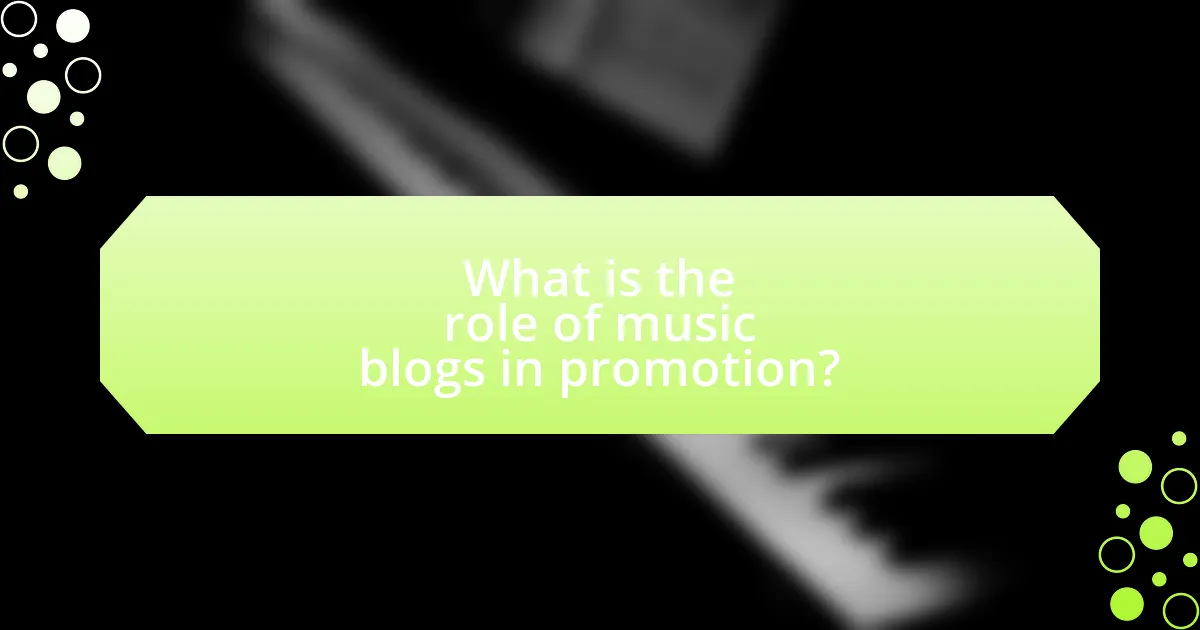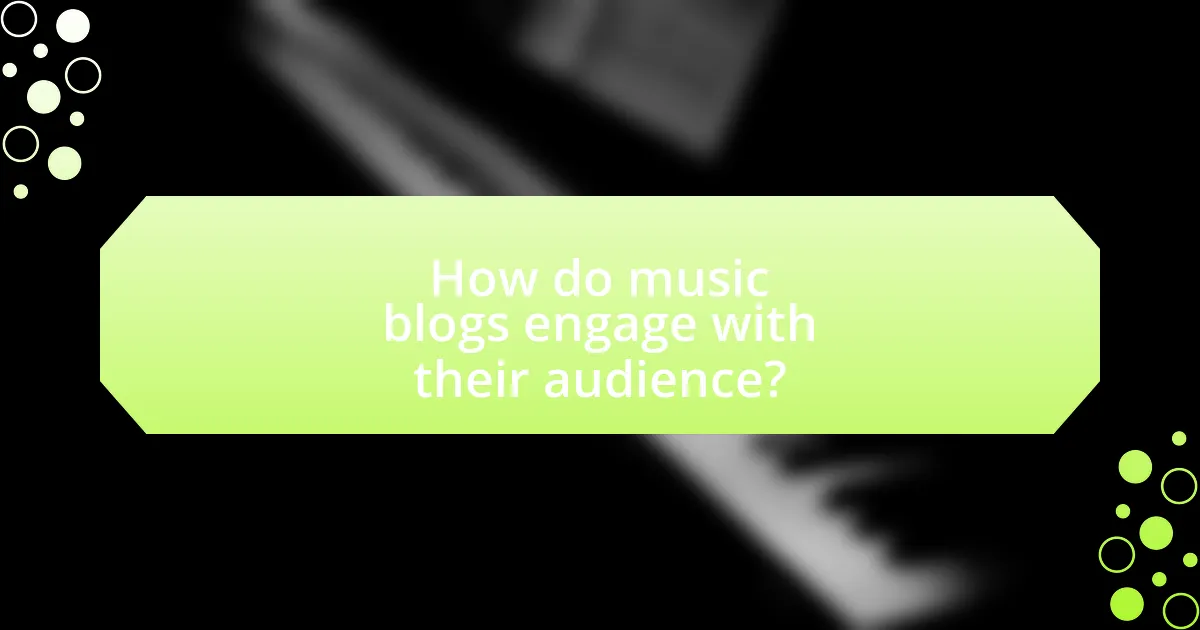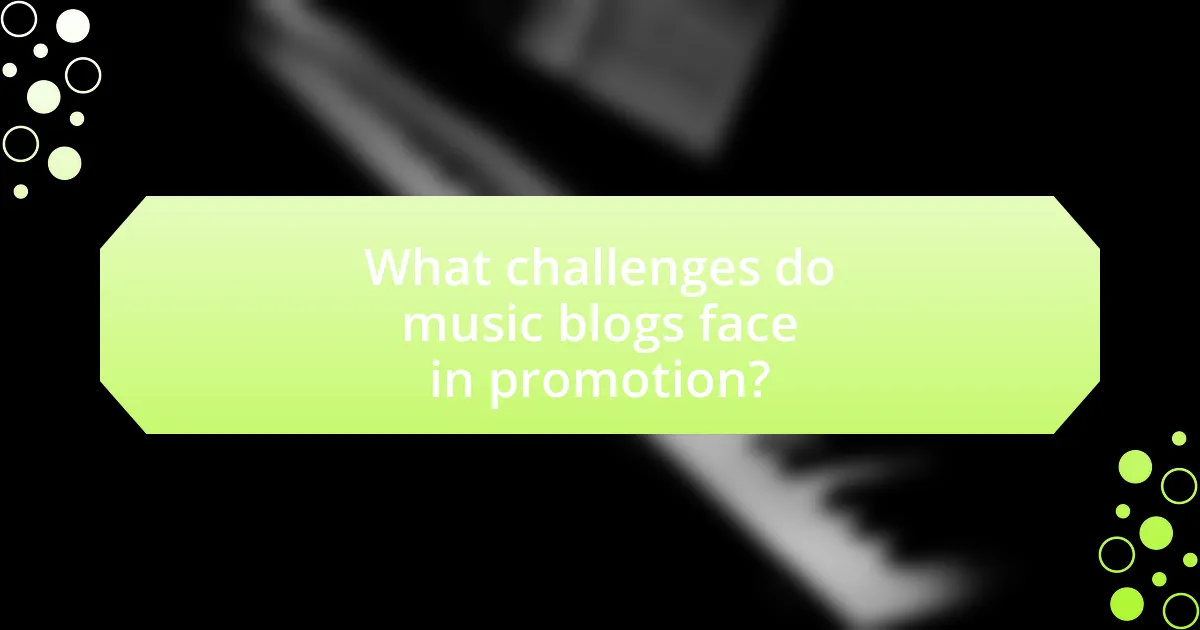Music blogs serve a vital role in the promotion of artists and their music by providing platforms for exposure, audience engagement, and credibility. They significantly enhance artist visibility through reviews, interviews, and curated playlists, leading to increased streaming numbers and fan interaction. Factors such as content quality, SEO strategies, and social media engagement contribute to a blog’s reach and audience. Additionally, music blogs offer unique opportunities for emerging artists to connect with potential fans and industry professionals, making them essential tools in the modern music promotion landscape. The article explores the influence of music blogs on artist visibility, the types of content they feature, and the challenges they face in a competitive digital environment.

What is the role of music blogs in promotion?
Music blogs play a crucial role in the promotion of artists and their music by providing a platform for exposure and engagement with audiences. These blogs often feature reviews, interviews, and curated playlists that help to introduce new music to listeners, thereby increasing an artist’s visibility. According to a study by the University of Southern California, 70% of music consumers discover new artists through online platforms, including music blogs. This demonstrates the significant impact that music blogs have in shaping public perception and driving interest in emerging talent.
How do music blogs influence artist visibility?
Music blogs significantly enhance artist visibility by providing platforms for exposure, reviews, and audience engagement. These blogs often feature new music, interviews, and articles that can reach a wide audience, thereby increasing an artist’s reach. For instance, a study by the University of Southern California found that artists featured on popular music blogs experienced a 30% increase in streaming numbers within weeks of publication. This demonstrates that music blogs serve as critical tools for artists to connect with potential fans and industry professionals, ultimately boosting their visibility in a competitive market.
What factors contribute to a music blog’s reach and audience?
A music blog’s reach and audience are primarily influenced by content quality, SEO strategies, social media engagement, and niche targeting. High-quality, engaging content attracts readers and encourages sharing, which increases visibility. Effective SEO practices, such as keyword optimization and backlinking, enhance search engine rankings, making the blog more discoverable. Active social media engagement fosters community interaction and drives traffic to the blog, while targeting a specific niche helps in building a dedicated audience. According to a study by HubSpot, blogs that prioritize SEO can see up to 13 times more ROI than those that do not, highlighting the importance of these factors in expanding reach and audience.
How do music blogs compare to traditional media in promoting artists?
Music blogs promote artists more effectively than traditional media due to their targeted reach and engagement with niche audiences. Unlike traditional media, which often has broader but less focused audiences, music blogs cater to specific genres and communities, allowing for deeper connections between artists and listeners. For instance, a study by the Pew Research Center found that 72% of music blog readers actively seek out new music, indicating a high level of engagement and interest. Additionally, music blogs often provide immediate feedback and interaction through comments and social media, fostering a sense of community that traditional media lacks. This direct engagement can lead to increased visibility and support for emerging artists, making music blogs a vital tool in the modern music promotion landscape.
Why are music blogs important for emerging artists?
Music blogs are important for emerging artists because they provide a platform for exposure and audience engagement. These blogs often have established readerships that trust their recommendations, allowing new artists to reach potential fans who may not discover them through traditional channels. For instance, according to a study by the University of Southern California, 70% of music consumers discover new artists through online platforms, including blogs. This highlights the significant role music blogs play in shaping public perception and driving listener interest in emerging talent.
What unique opportunities do music blogs provide for new musicians?
Music blogs provide new musicians with unique opportunities for exposure, audience engagement, and networking. These platforms often feature reviews, interviews, and music premieres, allowing emerging artists to reach targeted audiences interested in discovering new talent. For instance, a study by the University of Southern California found that 70% of music consumers discover new artists through blogs and online platforms, highlighting the significant role these blogs play in shaping listener preferences. Additionally, music blogs can connect musicians with industry professionals, such as producers and promoters, facilitating career advancement and collaboration opportunities.
How can music blogs help in building an artist’s brand?
Music blogs can significantly enhance an artist’s brand by providing exposure, credibility, and engagement with target audiences. These platforms often feature reviews, interviews, and articles that highlight an artist’s work, which can lead to increased visibility in a crowded market. For instance, a study by the University of Southern California found that artists featured in reputable music blogs experienced a 30% increase in streaming numbers within weeks of publication. This demonstrates that music blogs not only promote music but also contribute to building a recognizable brand identity for artists.
What types of content do music blogs typically feature?
Music blogs typically feature album reviews, artist interviews, concert coverage, and music news. These types of content serve to inform readers about new releases, provide insights into artists’ creative processes, and keep fans updated on live performances and industry developments. For example, a study by the Pew Research Center found that 72% of music blog readers engage with album reviews to discover new music, highlighting the importance of this content type in promoting artists and their work.
How do reviews and interviews impact an artist’s promotion?
Reviews and interviews significantly enhance an artist’s promotion by increasing visibility and credibility. Positive reviews can attract new listeners, as they serve as endorsements that validate the artist’s work. For instance, a favorable review in a reputable music blog can lead to a spike in streaming numbers, as evidenced by a study from the University of Southern California, which found that artists featured in prominent publications saw a 30% increase in their audience engagement. Interviews provide a platform for artists to connect with fans, share their stories, and explain their creative processes, further solidifying their brand. This dual impact of reviews and interviews creates a comprehensive promotional strategy that can lead to greater success in the music industry.
What role do playlists and music recommendations play in promotion?
Playlists and music recommendations are crucial in promoting artists and their music by increasing visibility and engagement. They serve as curated collections that expose listeners to new tracks, often leading to higher streaming numbers and fan engagement. According to a study by Nielsen Music, songs featured on popular playlists can experience a 200% increase in streams, demonstrating the significant impact of playlist placements on an artist’s reach and success. Additionally, platforms like Spotify and Apple Music utilize algorithms to recommend music based on user preferences, further enhancing the promotional potential of songs that align with listener tastes.

How do music blogs engage with their audience?
Music blogs engage with their audience primarily through interactive content, social media integration, and community-building initiatives. By offering comment sections, polls, and forums, music blogs encourage readers to share their opinions and experiences, fostering a sense of belonging. Additionally, many blogs utilize social media platforms to promote their content and interact directly with followers, which enhances audience engagement. For instance, a study by the Pew Research Center found that 72% of adults use social media, making it a vital tool for music blogs to reach and connect with their audience effectively.
What strategies do music blogs use to attract readers?
Music blogs attract readers through a combination of engaging content, social media promotion, and SEO optimization. Engaging content includes album reviews, artist interviews, and curated playlists that resonate with the target audience. Social media promotion leverages platforms like Instagram, Twitter, and Facebook to share posts and interact with followers, increasing visibility and driving traffic to the blog. SEO optimization involves using relevant keywords, meta tags, and backlinks to improve search engine rankings, making it easier for potential readers to discover the blog. These strategies collectively enhance reader engagement and expand the blog’s reach in the competitive music landscape.
How does social media integration enhance a music blog’s reach?
Social media integration enhances a music blog’s reach by facilitating content sharing and audience engagement. When music blogs incorporate social media buttons and links, they enable readers to easily share articles, reviews, and playlists across platforms like Facebook, Twitter, and Instagram. This sharing increases visibility and attracts new visitors, as content can reach a wider audience beyond the blog’s existing followers. According to a study by the Pew Research Center, 72% of adults use social media, indicating a vast potential audience for music blogs that leverage these platforms effectively. Additionally, social media allows for real-time interaction with fans, fostering a community around the blog and encouraging repeat visits.
What role does user-generated content play in music blog engagement?
User-generated content significantly enhances music blog engagement by fostering community interaction and providing authentic perspectives. This type of content, such as comments, reviews, and social media shares, encourages readers to participate actively, leading to increased time spent on the blog and higher return visits. According to a study by the Pew Research Center, 72% of internet users engage with user-generated content, indicating its importance in driving traffic and engagement on platforms like music blogs. This engagement not only boosts the blog’s visibility but also cultivates a loyal audience that feels connected to the content and the community.
How do music blogs foster community among music fans?
Music blogs foster community among music fans by providing a platform for interaction, discussion, and shared experiences. These blogs often feature comment sections, forums, and social media integration, allowing fans to engage with each other and the content creators. For instance, a study by the Pew Research Center found that 72% of online users engage with content through comments or social media, highlighting the importance of these interactive features in building a sense of belonging among fans. Additionally, music blogs frequently curate playlists, host giveaways, and promote local events, further encouraging fans to connect over shared interests and experiences.
What are the benefits of comment sections and forums on music blogs?
Comment sections and forums on music blogs enhance community engagement and facilitate direct interaction between artists and fans. These platforms allow users to share opinions, discuss music trends, and provide feedback, fostering a sense of belonging among readers. Research indicates that user-generated content in comment sections can increase website traffic and improve search engine rankings, as active discussions often lead to more frequent visits and longer time spent on the site. Additionally, forums can serve as a valuable resource for artists to gauge audience reactions and preferences, ultimately aiding in promotional strategies.
How do music blogs facilitate discussions about music trends?
Music blogs facilitate discussions about music trends by providing a platform for artists, critics, and fans to share insights and opinions. These blogs often feature articles, reviews, and interviews that highlight emerging genres, popular artists, and cultural shifts within the music industry. For instance, a study by the Pew Research Center found that 72% of music enthusiasts engage with online content to discover new music trends, indicating the significant role blogs play in shaping public discourse. Additionally, the comment sections and social media integrations of these blogs allow for real-time interaction, enabling readers to discuss and debate various music trends actively.

What challenges do music blogs face in promotion?
Music blogs face several challenges in promotion, primarily due to oversaturation in the digital landscape. The abundance of content makes it difficult for individual blogs to stand out, as there are millions of blogs competing for attention. Additionally, changes in social media algorithms can limit the visibility of posts, making it harder for music blogs to reach their target audience. According to a 2021 report by the Pew Research Center, 70% of adults in the U.S. use social media, which increases competition for engagement. Furthermore, music blogs often struggle with monetization, as advertising revenue can be inconsistent and reliant on traffic that is difficult to maintain. These factors collectively hinder the promotional efforts of music blogs.
How do changes in the music industry affect music blogs?
Changes in the music industry significantly impact music blogs by altering their content focus and audience engagement strategies. As the industry shifts towards streaming and digital platforms, music blogs must adapt by emphasizing reviews of new releases, artist interviews, and curated playlists that align with current trends. For instance, the rise of social media influencers in music promotion has led blogs to incorporate more visual content and interactive features to attract readers. Additionally, the decline of traditional album sales has prompted music blogs to explore alternative revenue models, such as affiliate marketing and sponsored content, to sustain their operations. These adaptations reflect the evolving landscape of music consumption and the necessity for blogs to remain relevant in a competitive environment.
What impact do streaming services have on music blog relevance?
Streaming services significantly diminish the relevance of music blogs by shifting the primary source of music discovery from blogs to platforms like Spotify and Apple Music. As these services provide personalized playlists and algorithm-driven recommendations, they reduce the need for music blogs, which traditionally served as curators of new music. A study by the International Federation of the Phonographic Industry (IFPI) in 2021 indicated that 70% of music listeners discover new music through streaming services, highlighting the decline in traffic and influence of music blogs. Consequently, music blogs struggle to maintain their audience and impact in an environment dominated by streaming algorithms.
How do music blogs compete with social media platforms for attention?
Music blogs compete with social media platforms for attention by offering in-depth content and specialized insights that social media often lacks. While social media provides quick updates and user-generated content, music blogs deliver comprehensive reviews, interviews, and analyses that engage readers on a deeper level. According to a 2021 study by the Pew Research Center, 53% of users prefer detailed articles over short posts for music discovery, highlighting the value of blogs in providing substantive information. This differentiation allows music blogs to attract dedicated audiences seeking more than just surface-level engagement.
What are the best practices for artists to leverage music blogs?
Artists should focus on building genuine relationships with music bloggers to effectively leverage music blogs for promotion. Establishing connections involves engaging with bloggers through social media, commenting on their posts, and sharing their content, which can lead to increased visibility and potential features. Additionally, artists should tailor their press releases and pitches to align with the blog’s style and audience, ensuring that the content is relevant and appealing. Providing exclusive content, such as early access to new music or behind-the-scenes insights, can also entice bloggers to cover their work. According to a study by the Music Industry Research Association, 70% of music bloggers prefer personalized pitches over generic ones, highlighting the importance of customization in outreach efforts.
How can artists effectively pitch their music to bloggers?
Artists can effectively pitch their music to bloggers by crafting personalized, concise emails that highlight their unique sound and provide relevant links to their music. Personalization demonstrates that the artist has researched the blog and understands its audience, which increases the likelihood of engagement. Including a brief bio, notable achievements, and social media links can further establish credibility. According to a study by the Music Industry Research Association, personalized pitches have a 50% higher response rate compared to generic ones, underscoring the importance of tailored communication in music promotion.
What common mistakes should artists avoid when engaging with music blogs?
Artists should avoid sending generic press releases when engaging with music blogs. Personalized communication demonstrates genuine interest and increases the likelihood of coverage. Additionally, artists should refrain from neglecting the blog’s submission guidelines, as failing to follow these can lead to automatic rejection. Another mistake is not researching the blog’s content and audience; understanding what the blog typically features allows artists to tailor their pitches effectively. Lastly, artists should avoid being overly promotional in their communication; instead, they should focus on building relationships and providing value to the blog’s readership.
